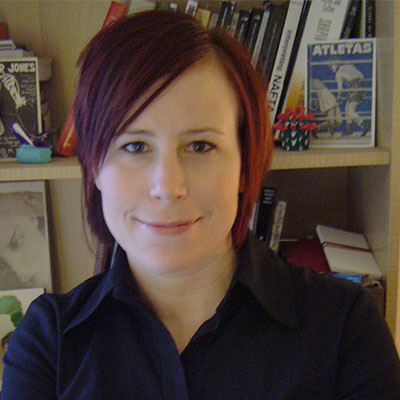KimberlyNolan García
MALAS
|
2001

Job : Profesora/ investigadora de tiempo completo (Assistant professor), International Studies Department, Centro de Investigación y Docencia Económicas (CIDE)
Location : Mexico City, Mexico
Why did you decide to pursue a MALAS degree at UNM?
At the time I was looking for graduate programs for the PhD in political science I knew that I was mostly interested in Latin American politics, to pretty much the exclusion of everything else. I wasn’t interested in US politics or studying US politics at all, or Europe, I was largely focused on developing countries, and so I wanted a program with the flexibility of being able to concentrate courses and any work on Latin American cases, and political questions that were relevant to the region. However, it is rare that a department would have more than a few Latin Americanists in the faculty, so it became clear quickly that I would need the Latin American politics grounding first through an MA program. I chose UNM over other schools because of the region-wide versus Mexicanist focus found in other good programs, even though I always was interested In Mexican politics first. Ironically I ended up studying labor issues in NAFTA from the Mexican experience and went to work in a Mexican institution.
How did your MALAS degree impact you academically, professionally, and personally?
The academic payoff from starting my academic career at the LAII is straightforward: I did get the region-wide grounding I was looking for both in Political Science and in Economics, which was my second concentration. Because the program asks for 80% Latin American content in coursework, I did end up having to research and write papers around examples or experiences in specific Latin American states, or trends in the region, even for the classes that were research design. I became familiar with regional sources of information and data, and the most important newspapers, sources of political analysis and academics in countries and in the region, which I still rely on. I think there is an enormous difference in understanding the politics of countries if one only relies on US sources versus sources on the ground, and I took all of this background knowledge into the PhD program.
Professionally, I hope the MALAS degree transmits legitimacy and competence in Latin American politics to anyone looking at my CV, and that it is reflected in my work. The MALAS degree was really rigorous and demanding and required an extraordinary amount of reading, which was the basis of everything I did afterward. By the time I had entered the PhD program I had a solid understanding of Latin American political economy in historical perspective and I knew the political history of major countries, I was oriented towards the reliable in-country sources to build upon that. I do believe that this additional training makes me more competitive for grants and opportunities that come up because it reads as deep knowledge of the region that has been sustained for about 15 years now.
Personally, marinating in Latin American studies for so long has definitely helped me navigate different social and cultural contexts from the US to Latin America. If I have meetings or workshops, need to contact colleagues, or want to make friends it gives me more confidence to be outgoing in those situations because there is some base of familiarity there that everyone in the room shares. Even though I’ll always be an outsider as an American, I also can fit in too because everyone is working from the same assumptions.
What's your current work look like?
I am an associate professor in a small International Relations department (we are just 14 people) in a publically funded school that is part of Mexico’s science and technology ministry, CONACYT. In Mexico, IR and Political Science are separate disciplines, but my school runs a combined IR/PSC program for the bachelor’s degree, which is the only one in the nation. I regularly interact with my colleagues in political science both personally and professionally, and feel the division is solely an administrative one. My school is a research oriented institution, so we are expected to write and publish above all else, generally in US or European peer reviewed journals, with few exceptions. Because of the research focus, there is a low teaching load, so I currently teach one course in the Fall and part of a course for the economic department in the Spring. We are assigned first year students to mentor, and I put effort into that, stretching the year commitment to their entire time at CIDE in some cases. Our students generally move into higher level positions in the ministries of the Mexican government as we are in the capital, but some go off to graduate school in the US and Europe, and I help them figure out that process. My classes are very small, the largest right now is 13 students and my smallest has been 3, so there is an expectation that professors will be involved in providing extra help for students falling behind and so on. Students have to write a thesis to graduate, and I am also involved in those committees. Finally, because CIDE is well known in the capital as a source of rigorous research for policy outcomes, and because we are considered reasonably dependable observers of politics, I do quite a bit of work with the media, giving interviews on labor reform in México, issues around NAFTA, and surprisingly enough, US politics and foreign policy as it relates to Mexico.
